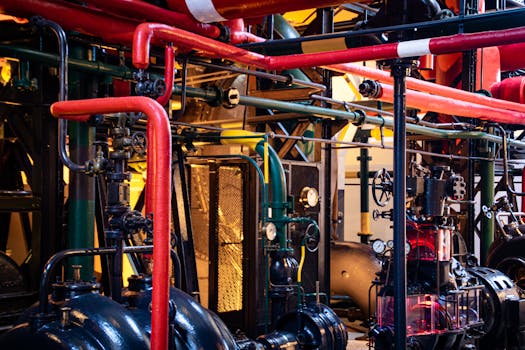
Exploring the Principles of Thermodynamics in Mechanical Systems
Takeaways: Understanding thermodynamics is essential for engineers and scientists as it governs the behavior of energy systems. This article delves into the fundamental laws of thermodynamics, their applications in mechanical systems, and the significance of efficiency in energy transfer.
Thermodynamics is a branch of physics that deals with the relationships between heat, work, and energy. In mechanical systems, these principles can be observed in various applications, from engines and refrigerators to heat exchangers. This article will provide an overview of the fundamental laws of thermodynamics, explore their relevance in mechanical systems, and discuss the implications of these principles for engineering and sustainability.
The Laws of Thermodynamics

First Law of Thermodynamics
The First Law, also known as the Law of Energy Conservation, states that energy cannot be created or destroyed, only transformed from one form to another. In mechanical systems, this principle is crucial as it governs the conversion of thermal energy into mechanical work. For example, in an internal combustion engine, the chemical energy stored in fuel is converted into thermal energy through combustion, which then produces mechanical work to drive the vehicle.
Second Law of Thermodynamics
The Second Law introduces the concept of entropy, which measures the degree of disorder in a system. It states that in any energy transfer, there will always be a portion of energy that is dissipated as waste heat, making it impossible to convert all the input energy into useful work. This law is fundamental in analyzing the efficiency of mechanical systems, such as heat engines, which can never achieve 100% efficiency due to entropy.
Third Law of Thermodynamics
The Third Law posits that as the temperature of a system approaches absolute zero, the entropy of a perfect crystal approaches zero. While this law has less direct application in everyday mechanical systems, it provides a theoretical foundation for understanding the limits of energy transfer and efficiency.
Applications of Thermodynamics in Mechanical Systems

Heat Engines
Heat engines are devices that convert thermal energy into mechanical work. The efficiency of a heat engine can be analyzed through the Carnot cycle, which serves as a theoretical benchmark for performance. By understanding the thermodynamic principles at play, engineers can design engines that maximize work output while minimizing energy waste.
Refrigeration and Heat Pumps
Refrigeration systems and heat pumps operate on the principles of thermodynamics to transfer heat from one location to another. Understanding how these systems exploit the refrigeration cycle can lead to more efficient designs, reducing energy consumption and operating costs.
Thermal Management Systems
In mechanical systems, managing heat is crucial for maintaining optimal performance and longevity. Thermodynamics helps engineers design effective thermal management systems that dissipate excess heat, ensuring components operate within safe temperature limits. This is particularly important in high-performance applications such as aerospace and automotive engineering.
Conclusion








